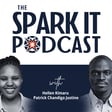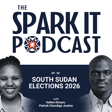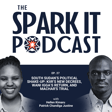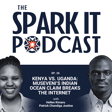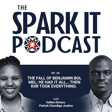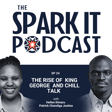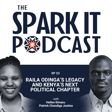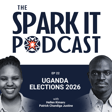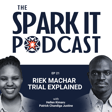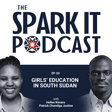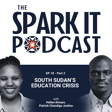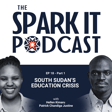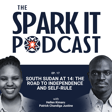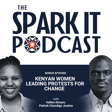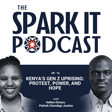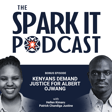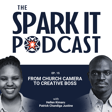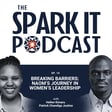Become a Creator today!Start creating today - Share your story with the world!
Start for free
00:00:00
00:00:01

Turn Ideas into Action: From Volunteering to Building a Social Enterprise
Discover how volunteering can change your life and community! In this episode, Hellen Kimaru shares her journey from being a university student and passionate volunteer to founding LatitudeZero Opportunities, a social enterprise empowering hundreds of youth in Kenya. We discuss the transformative power of volunteering, building hands-on skills, breaking gender stereotypes, and turning passion into meaningful action. Tune in for powerful stories, practical advice, and heartfelt insights to help you turn your ideas into action.
Transcript
Introduction and Guest Speaker Overview
00:00:01
Patrick Abure
ah Welcome to another episode of the Spark It podcast with me, Patrick CJ and my co-host Kimaru Baby.
00:00:13
Patrick Abure
Today we'll be exploring ways to turn ideas into action. and Who better to talk to about this topic?
00:00:23
Patrick Abure
That's my co-host, Kimaru Baby. Kimaru Baby has founded and built Latitude Zero Opportunities as a very powerful platform that is currently empowering over 300 young people in Kenya.
00:00:43
Patrick Abure
Isn't that right?
00:00:44
Kimaru
Mm-hmm.
00:00:46
Patrick Abure
Yeah.
Kimaru's Journey and Inspiration for Latitude Zero
00:00:48
Patrick Abure
So I have the right person to speak to ah about this topic.
00:00:48
Kimaru
Yeah.
00:00:53
Patrick Abure
And, you know, they say that a journey of a thousand miles begins with a single step. And I'm just wondering for you, what was that moment that inspired you to start Latitude Zero?
00:01:17
Kimaru
Oh, wow. We are getting just down to getting things done. Yeah. Anyway, that's fine. um So ah Latitude Zero, it's actually a really really long story, honestly.
00:01:29
Kimaru
But the inspiration came from when I was in campus. There were these people who actually sponsored me through uni. And basically, one of the things that we were supposed to do was to volunteer your services.
00:01:43
Kimaru
It could be, you could give in terms of time ah talent or money. So they would say it was the three T's, time, talent, or treasure.
00:01:54
Kimaru
Yeah. So we would give back and then we would like write reports about the things we were doing. Yeah. So I think around... I would say maybe the first year of my university, I was struggling with like something impactful to do because I felt like for the giving back, we will used to call them giving back commitments.
00:02:15
Kimaru
I felt like I needed to i i needed to make something
00:02:16
Patrick Abure
Mm-hmm.
00:02:19
Kimaru
or to come up with something that would have sort of an impact and I would find fulfilling. Yeah, so when i got to my ah second year of uni, I started doing bidwarking.
00:02:32
Kimaru
Yeah, so I literally was a hawker at school. During the the day I was in class, in the evening, and at night I'm doing a bit of beadwork in my little house and then ah when the things are ready after classes i would like go to the hostels and you know sell these things to students and at the end of the day started making money and I was so excited about that and I was like wow so at this point I'm like so why am I struggling with a give back commitment if you can give in terms of your time talent or treasure
00:03:07
Kimaru
My talent at this point was I could do this bid working and I could sell it and it was making some, you know, like site it was like a side hustle for me at this point because I would make money out of it.
00:03:11
Patrick Abure
Right. Yeah.
00:03:18
Kimaru
Yeah. So I decided I'm going to make it like um my commitment. Yes.
00:03:25
Patrick Abure
right
00:03:25
Kimaru
So I started training other girls at school and outside school, like women around my home and stuff like that when I was on on holiday. Yeah. And I found it very fascinating because if I can teach you a skill and you at the end of the day, I can tell you like, this is how you can price your products.
00:03:35
Patrick Abure
yeah
00:03:43
Kimaru
ah these are this is how you could market your product, this is how you could make money because it's making money for me. and Then I found it more fulfilling because now it was sort of, it was a give back commitment that was relating to exactly what I was doing or what I was kind of becoming now passionate about at that by particular
Finding Meaning in Volunteer Work
00:04:01
Kimaru
point. So I found it very, ah remember in another episode we talked about purpose.
00:04:07
Kimaru
At that point I found it, like I felt like it was a purpose for me.
00:04:07
Patrick Abure
Right. Mm-hmm.
00:04:10
Kimaru
It was something that was giving me some level of, fulfillment yes and that's where i would say the um the journey to now latitude zero began because now i started doing that and by the time i was done with uni uh the same organization that sponsored me through uni actually i applied for a job there was one time when we were almost done in school they were like oh by the way we are looking for people program assistants to help us with some work Yeah, of course, again, doing almost similar things with girls because they were offering scholarships and stuff like that.
00:04:46
Kimaru
Yeah, so I started working with them. And at some point, they sent me to um a very remote place in Kenya. It's called Respokot. And yeah, there was like 100 girls over there rescued from early marriages and FGM.
00:04:54
Patrick Abure
Mm-hmm. Mm-hmm.
00:05:01
Kimaru
And they were so passionate. They had been gathered in some place. where they would be given like a six months, um, what is it called? A six months training program where they would be taught like various skills from agriculture. They would do culinary skills.
00:05:17
Kimaru
they would do digital literacy and stuff like that. Yeah. So that's, ah so for me, that was very fascinating. And i worked with them for a while.
00:05:28
Kimaru
And by the time, i think two years down the, no, while I was still at Westpokot because I was stationed there for like six months, I was like, well By the way, let me just, i also I had won some award through again the same organization while I was still in school just before I had finished.
00:05:45
Kimaru
So ah for like one of the best give back commitments.
00:05:45
Patrick Abure
Mm-hmm.
00:05:49
Kimaru
So they were supposed to give us some small money. Yeah. And when they gave me this money, I think that's when I had just started working with them. So in my free time, i was like, if I'm here, i am working with them.
00:06:02
Kimaru
i might as well train these girls how to do bidwarking. Yeah, so I would work during the day and then in the evenings I'll be like, okay, if I was like, interested in signing for bidwarking classes, just see me.
00:06:15
Kimaru
And then and a lot of those girls actually signed up. I think around like almost half of that class signed up and i would teach them. So I taught them bidwarking.
00:06:23
Patrick Abure
Wow.
00:06:24
Kimaru
Yeah, I taught them bidwarking skills. And when I stopped working ah with this particular organization, I started doing freelance work.
00:06:36
Patrick Abure
Right.
00:06:36
Kimaru
I wrote, a wrote and wrote and wrote.
00:06:39
Kimaru
A friend of mine introduced me to writing, uh, in the context of, um, like monetizing the skill. So I started writing.
00:06:46
Patrick Abure
Right.
00:06:47
Kimaru
I wrote day and night, it was good money. So it would keep you on your toes and your neck on your desk.
00:06:52
Patrick Abure
Right.
00:06:54
Kimaru
Yeah, so I wrote, and at this point, another friend of mine, we were working on some community project. We had studied like some digital literacy classes in Nakuru where I live or where I come from. um Yeah, so i would give back again in in terms of my time and my talent.
00:07:12
Kimaru
Yeah, so those are the things I was doing in Akuru with this digital literacy, whatever we were doing.
00:07:13
Patrick Abure
Right.
00:07:19
Kimaru
Yeah, and eventually, so i remember when I was in campus, used to tell this particular friend, I'll be like, oh, by the way, I think one day I would want to start a school where i would teach people ah skills.
00:07:31
Kimaru
Because I kind of felt like while while I was still in uni, I would literally see how people, like the clear university, you have a degree, but people are still jobless. Like people are staying two years down the line.
00:07:42
Patrick Abure
Mm-hmm. Mm-hmm.
00:07:44
Kimaru
They're still jobless. They are like, I can't find a job. So I kind of felt like what is really the value of a degree? And I'm not trying to say
The Formation and Mission of Latitude Zero
00:07:53
Kimaru
a degree is not important, but I used to feel like the kind of, I feel like sort of in Kenya right now,
00:08:00
Kimaru
I think almost all of us are very educated. People have degrees and all that. But in terms of the opportunities out here, the opportunities are very limited.
00:08:11
Kimaru
And so ah people will clear school. They're done. They're looking for jobs and two years, three years down the line, somebody has not has not gotten a job. And also because I feel like also the education system has sort of emphasized fact that, you know, get the degree.
00:08:25
Patrick Abure
Yeah.
00:08:27
Kimaru
I don't feel like people, we were taught necessarily how to think outside the box. It's more of just read, read, read.
00:08:33
Patrick Abure
Mm-hmm.
00:08:35
Kimaru
It's like we're being prepared to work hard. do well and you will get a job. But the reality the reality out out outside here, it's all the same.
00:08:41
Patrick Abure
Right.
00:08:45
Kimaru
You will work hard, you'll get that degree, but getting the job is really the trick here. So for me, the fact that I was doing bidworking in uni and i could get I could make money, I felt like, what if, if I'm a student, people are looking down on stuff like that,
00:08:59
Patrick Abure
Yeah.
00:09:01
Kimaru
skills, those kinds of specific skills, but I didn't feel like doing whatever I was doing was taking away from me also being ah what a university student in the context of, I found so much value.
00:09:09
Patrick Abure
Yeah.
00:09:14
Patrick Abure
Mm-hmm.
00:09:16
Kimaru
Like I'm a university student, I'll get my degree, but on the side, I have learned how to become a marketer, a salesperson. a designer, all these kinds of things.
00:09:27
Kimaru
And it's making me money. So, yeah, so I thought that it's important to also focus on skills that can actually make you, ah oh help you create even your own employment ah instead of just focusing on just a degree. And also feel like people, especially here, people have a lot of time in school because there's very limited part-time jobs to do.
00:09:47
Kimaru
So I feel like in between classes or school, there is a lot of ta as and and universities there's that lot of time that a university student has which ah they could probably either use to learn a skill or maybe even run a small business or whatever whatever it takes yes and I feel like
00:10:00
Patrick Abure
Right.
00:10:05
Kimaru
yeah those were the gaps i i could see while i was still at the uni yeah so now i'm done and i have stopped also working with this organization and i'm doing my freelance work and at this point i feel like i feel like all the things i'm doing it's not necessarily like my the degree that i went to school to do has been the one making me money it has been these skills that i learned on the side
00:10:29
Patrick Abure
right
00:10:29
Kimaru
Like I didn't go to a school to learn how to do writing. It's something i of course enjoyed writing since I was a child, but now I honed the skills way later after uni or during and after the uni, yes.
00:10:42
Patrick Abure
right
00:10:44
Kimaru
So those are things I didn't have to go to a class to learn, but I have learned these skills and they're making me money. So I used to feel like if only I could address this issue,
00:10:55
Kimaru
then it would make a lot of sense. So I would say that sort of, that's like sort of the background of where Latitude Zero began. Yeah.
00:11:06
Patrick Abure
wow
00:11:08
Patrick Abure
the
00:11:08
Kimaru
Oh yeah.
00:11:09
Kimaru
Mm-hmm.
00:11:10
Patrick Abure
It's a very powerful story, ah considering how you transformed it for just a volunteer activity that you are doing as a way to give back to the community and turning that into a social enterprise that is now helping 300 others become employable.
00:11:13
Kimaru
Mm-hmm.
00:11:21
Kimaru
Mm-hmm.
00:11:26
Kimaru
Yeah.
00:11:36
Kimaru
Oh
00:11:38
Patrick Abure
Yeah, that's fantastic.
00:11:41
Kimaru
oh yeah, and actually to to top up that, ah i And now up to the point where it comes into existence is as I'm doing my my freelance work.
00:11:49
Patrick Abure
Yeah.
00:11:52
Kimaru
So this friend of mine that I'm talking about, we we were working on another organization called Hierarch Tech Together. And i I kept telling them, oh, I would want to start a school anywhere at some point. Yeah.
00:12:03
Kimaru
So... um So they they met these these guys. ah They live abroad. So they met with these people. And these people introduced, ah some some some friend of theirs introduced them to some organization that works in Kakamega.
00:12:17
Kimaru
And they had an orphanage with kids, like from the ages of around 6 to 24. So a bit of grown-ups anyway.
00:12:24
Patrick Abure
Yeah. Mm-hmm.
00:12:25
Kimaru
Yeah. And these people, were they wanted they wanted to set up a computer lab and of course the hierarchic at that point donated they donated um computers and I remember it was like in 2019 during Valentine's me and two more people went there and we were having fun with the kids
00:12:39
Patrick Abure
yeah
00:12:47
Kimaru
we set them We set up a lab for them with these computers that had been donated.
00:12:49
Patrick Abure
yeah
00:12:51
Kimaru
And then for like around three days a weekend, yeah, we showed them how to use those computers. And then when I went home, I am speaking to this friend of mine and I'm like, hey, by the way, I think for kids who are just having access to a computer for just that particular weekend for the first time in their life, I don't think it makes any difference for them. They'll probably not utilize those resources in the best way possible.
00:13:17
Kimaru
So, ah and then because it was around, that was February. So I was like, what a about maybe during the April holiday ah when they are all home, for example, including the ones who are inbo in boarding school, what if I go there and volunteer like for a month
00:13:22
Patrick Abure
Yeah. Yeah.
00:13:36
Kimaru
This volunteer thing keeps coming up. Yeah.
00:13:38
Patrick Abure
yeah
00:13:38
Kimaru
So i I think people should actually volunteer. Yeah. So um I go there for, so they're like, yeah, sure. If you're available, I'll talk to the guys, the owners of the home. And if they are accepted, you can go.
00:13:51
Kimaru
So they accept and they're like, yeah, sure, sure. So i was like, I can go there for a month because i you know I was doing freelance work. So i I felt like it was a bit flexible.
00:13:59
Patrick Abure
Yeah. Mm-hmm.
00:14:01
Kimaru
So I was like, let me go there for a month and teach them how to fully utilize those computers. And then now while we are still organizing, I still tell this person, hey, and by the way, I have a lot of beadwork, even I have a lot of beads in my house.
00:14:14
Kimaru
I'm like, i have I have a lot of beads in my house. So I'm thinking if I'll be going there for like a month, I might as well carry ah the beads and go alternate.
00:14:25
Kimaru
So I'll have sessions where I'm teaching them digital digital literacy and another lesson for beadworking. And they're like, sure, if it's it's so too much work, it's okay.
00:14:31
Patrick Abure
Right. Mm-hmm. Mm-hmm.
00:14:35
Kimaru
So during the holiday, me and my other brother, we go there for a month. and we we volunteer there for a month. So we are teaching the kids digital literacy.
00:14:45
Kimaru
Some other time, we're exchanging that with bid working. And by the end of that ah period, I take like really nice photos of the kids, the products they had made, some videos of the work they were doing. And for me, I was really impressed by what they had done, which is why I was actually documenting this whole process.
00:15:03
Kimaru
And anyway, so I decided like, okay, I already have this stuff. Let me just share it. So I write like a really nice report and I attach their photos and put the videos on a folder and i send them to these people and they're like, yeah, that's what they did for the holiday.
00:15:11
Patrick Abure
Yeah.
00:15:20
Kimaru
And it's nice. Yeah. So we leave. The next thing I know my friend is asking me, oh, by the way, these guys, yeah asking you they're asking if you would like to be employed.
00:15:31
Kimaru
Like, ah what do you want? Do you want to be employed or whatever? so ah yeah So apparently they had been they had wanted to actually start a skills training program at their home for a while, but they had it had been a bit unsuccessful.
00:15:46
Kimaru
So they were really impressed by what we were able to achieve ah um within such a short period of time. okay
00:15:52
Patrick Abure
Right.
00:15:52
Kimaru
Yeah, so ah so when my friend tells me this, he's like, so what do you want? Do you want to get employed? And then they're like, by the way, you know, you've always said that you wanted to start a school.
00:16:05
Kimaru
This could be you.
00:16:06
Patrick Abure
Yeah. Yeah. yeah
00:16:09
Kimaru
ah Yeah, and then they go ahead and and float the idea of, because we were already doing digital literacy in Nakuru with Hierarch Tech.
00:16:17
Patrick Abure
Yeah.
00:16:19
Kimaru
They're like, what if we combine these ah skills, a skills training program in terms of like hands-on skills with the with the digital literacy.
00:16:30
Kimaru
And yeah, that's how Latitude Zero started actually. We actually went ahead and registered a company
00:16:37
Patrick Abure
wow
00:16:38
Kimaru
Yeah, which is now Latitude Zero. And we were like, yeah, this is what we are offering or maybe our services will be. We will be teaching people. Our our goal was to bridge the gap by providing skills training to people or to young people so that we can equip them. So either they can, you have the skills to either you want, if you want to start your own business, you can start your own business.
00:17:01
Kimaru
if you If you want to be work ready, you are work ready. Because if I teach you like say photograph photography skills today, you could either set a business or you could go to somebody who already has a business and also be employed there.
00:17:07
Patrick Abure
Yeah.
00:17:12
Patrick Abure
Right.
00:17:13
Kimaru
Yeah, so that was sort of the goal of Latri Zero and why we actually started it. And the reason why I was giving this background story, it's because for me, it started way back from when i started doing those give back commitments ah when I was still at the university, because I would be like, yeah, if only if only like as students at the school could see the beauty of learning a skill on the side,
00:17:40
Patrick Abure
Right.
00:17:40
Kimaru
and monetizing that skill because it had worked for me i was making extra money
00:17:44
Patrick Abure
Yeah.
Training Programs and the Value of Skills
00:17:46
Kimaru
yeah i was bowling the uni yes i had money oh my god good days good old days yeah so anyway yes that's the genesis of latif zero and how it actually came into existence
00:17:46
Patrick Abure
Right. Wow.
00:17:54
Patrick Abure
and
00:18:00
Patrick Abure
wow That is fantastic and and very inspiring, to be honest. So basically you have trained 300 young people between the ages of 16 and 24 on beadworking and digital skills.
00:18:08
Kimaru
who
00:18:23
Kimaru
Between the ages of six.
00:18:24
Patrick Abure
hu Six?
00:18:27
Kimaru
From as young as six years old. Yeah, you teach kids how to use the computer.
00:18:29
Patrick Abure
Wow.
00:18:33
Patrick Abure
Wow.
00:18:33
Kimaru
And really good.
00:18:34
Kimaru
Yeah.
00:18:35
Patrick Abure
so So how are they doing now?
00:18:38
Kimaru
Oh my God, those kids. hu You know, when we started the the training program, it used to feel like, sometimes you feel like you can't see the progress.
00:18:44
Patrick Abure
Yeah.
00:18:48
Patrick Abure
Right.
00:18:49
Kimaru
And especially now that I have mentioned the ages of those kids, especially the, I remember when we started, like the very young ones who are like six years, seven and all that, sometimes, especially with the bid working, we would limit them on what they could do.
00:19:04
Kimaru
We were like, oh no, these are no, these are no, maybe we're excluding them from particular programs. Until later,
00:19:09
Patrick Abure
Yeah.
00:19:10
Kimaru
You would be seated somewhere and watching them in their free time. They're so curious. They go sit next to somebody who is doing the beadworking and they're watching. Sometimes they they try to sneak and get some beads and they try to do it.
00:19:19
Patrick Abure
Yeah.
00:19:23
Patrick Abure
Yeah.
00:19:25
Kimaru
Eventually, i realized that these kids... It didn't matter what age they were. They were so good and so passionate and so curious.
00:19:30
Patrick Abure
yeah
00:19:35
Kimaru
so i So I stopped excluding them. It took me a while, but when I realized I stopped excluding them from any of the programs, so like all our programs became very open to all the children. Like it doesn't matter what age you are at, you just need them to teach them a bit of responsibility.
00:19:45
Patrick Abure
Right.
00:19:50
Kimaru
So when we started, there was a bit of resistance because you are trying to introduce something like ah the traditional way of doing things in Kenya is go to school, finish school, do whatever, whatever.
00:19:50
Patrick Abure
Yeah.
00:20:01
Kimaru
This whole skills training thing, apart from the fact that the government ah in recent years has introduced the
00:20:03
Patrick Abure
Yeah.
00:20:09
Kimaru
uh competency based curriculum something whatever something like that which is a sort of embracing a bit more of skills training but still not at that capacity so yeah initially it was such a ah hassle actually to get them to sort of understand what they're trying to do because i remember we introduced to them we're trying to teach them for example how to do gardening
00:20:12
Patrick Abure
Mm-hmm. Mm-hmm.
00:20:18
Patrick Abure
yeah
00:20:31
Kimaru
And I remember at some point, one of those kids, and she was actually in high school, she was like, why are you even trying to teach us how to garden?
00:20:38
Patrick Abure
who
00:20:42
Kimaru
we You know, now it's a home and yeah they have like sponsors from outside who donate ah to you know make their work easier at their home for sure.
00:20:42
Patrick Abure
yeah
00:20:50
Kimaru
It's like a non-profit, yeah? So even the kids already know like they have sponsors because they are matched with specific sponsors. So they're asking us, so this kids this kid asks us, why are you teaching us farming when somebody's already providing the vegetables?
00:21:11
Kimaru
Like she couldn't understand like why the hassle. So for that particular thing, for example, we had to like have a lot of talks with them and show them the importance of whatever, because I was trying to tell them, sometimes we think about farming as this backward thing, or maybe something that you need like a really huge farm.
00:21:15
Patrick Abure
bri
00:21:28
Patrick Abure
Yeah.
00:21:31
Kimaru
When you could do something, if you're living in a town, you could do like farming at your balcony.
00:21:32
Patrick Abure
Yeah.
00:21:37
Kimaru
using like, you know, planters or whatever thing that is available to you. Yeah. So we taught them the value of something like that.
00:21:42
Patrick Abure
Yeah.
00:21:46
Kimaru
And like years down the line, if you go to that home right now, their lives have completely changed. now that you're talking about how that looks like for them right now you go there every small space they have or every available space they have or the farm the space they they have put specifically for the farm you would find like things are blossoming onions all manner of vegetables and it's very clean they have made sure that it is the land is tilled the vegetables are taken care of
00:21:53
Patrick Abure
Right.
00:21:56
Patrick Abure
Right.
00:22:19
Kimaru
If I show you pictures of how that space looked like when we got there the first time and now how it looks like right now, you wouldn't think it's the same home.
00:22:31
Patrick Abure
Right.
00:22:31
Kimaru
Like there has been sort of a very big ah mindset shift.
00:22:38
Kimaru
including in the whatever, we including in the lives of those kids. Cause also there was one also, I remember when we were doing bidwarking at some point, I think they thought that this is exhausting stuff.
00:22:47
Patrick Abure
Yeah.
00:22:51
Kimaru
Like, why are you telling us to do bidwarking? What's the importance anyway? And at some point there was like, it was a hassle. Cause for me, I felt like I want you guys to see the importance of this thing.
00:23:02
Kimaru
I really want you to do it. Cause I already know the impact it can have on someone. Yeah.
00:23:07
Patrick Abure
right
00:23:08
Kimaru
And this kid says, ah she was also in high school. She's like, no, I'm not doing it anymore. And she quit. But eventually, after she was done with the high school, i I remember one of those holidays, I went for a holiday program.
00:23:21
Kimaru
And she comes and sits there. And i I've taught the kids and I am done. And then she's like, Kimaru, I have something to tell you. I'm like, okay, I'm listening. She's like, thank you very much.
00:23:34
Kimaru
She's like, thank you very much.
00:23:36
Patrick Abure
Yeah.
00:23:36
Kimaru
I'm like, what's up? She's like, you know, I used to think that bedwaking was such, it so it wasn't something I should learn or stuff like that. But even with the little i learned and when I came back and tried to also of continue learning from the other kids, now that I'm at the, she was, she had now enrolled in college.
Changing Mindsets and Success Stories
00:23:56
Kimaru
She's like, this beadworking has been very instrumental for me because now I do in my part-time or when I when i don't have classes, I do beadworking and I sell this stuff that I make to to students and that's how I earn extra money at school.
00:24:01
Patrick Abure
right
00:24:17
Kimaru
And I'm looking at her like, impressive.
00:24:21
Patrick Abure
Wow. That's really nice.
00:24:23
Kimaru
Yeah.
00:24:24
Patrick Abure
Yeah.
00:24:24
Kimaru
Mm-hmm.
00:24:25
Patrick Abure
so
00:24:26
Kimaru
Mm-hmm.
00:24:26
Patrick Abure
So basically, when you guys were training them, um particularly to do with beadworking, what exactly were you guys training them on?
00:24:32
Kimaru
Mm-hmm.
00:24:40
Patrick Abure
Like how to make necklaces, how to make bracelets, or what exactly?
00:24:47
Kimaru
Oh yeah yeah, it was like you met you teach them how to make earrings, necklaces, bracelets, everything that you can do with beadworking and even how you can use the same beads to decorate something.
00:24:57
Patrick Abure
Right.
00:25:00
Kimaru
Yeah, it used to be like how you can manipulate different types of beads to make, especially mostly jewelry.
00:25:01
Patrick Abure
Right.
00:25:08
Kimaru
Yeah, so that was basically it.
00:25:08
Patrick Abure
Mmhmm.
00:25:09
Kimaru
At some point, we wanted to get to a place we could teach them how to do, like, you see the Masai sandals? Yeah, we wanted to get to a place where we could help them do that.
00:25:15
Patrick Abure
Yeah.
00:25:19
Kimaru
I believe right now somebody's teaching them actually how to do shoemaking, if I'm not wrong, the last time I checked, yes. Yeah, but yes, they right now those kids can make any type of beadwork you get to to them.
00:25:34
Kimaru
they can make They have the best products out here. I have pictures somewhere of the last products they made like last year and it's really impressive and they're so creative.
00:25:39
Patrick Abure
Wow.
00:25:44
Kimaru
And you know, at some point, let me tell you something interesting. When you get there,
00:25:47
Patrick Abure
For sure.
00:25:48
Kimaru
the bedworking thing we were doing, the dudes, the boys, they would feel like, oh, that sounds very girlish, I will not do. oh And then yeah i used to tell them, ah when as far as skills are concerned, you can do anything.
00:25:59
Patrick Abure
Yeah.
00:26:03
Kimaru
Don't limit yourself and say, This is what women should do. This is what men should do. All these things we are teaching you, anyone can do. A woman can do STEM courses. A man can do STEM courses.
00:26:14
Kimaru
A man can do beadworking. A woman can do beadworking. At the end of the day, they don't define whether you have femininity or your masculinity. This ah this is just work You could be the best designer and you're a man.
00:26:26
Patrick Abure
Right.
00:26:28
Kimaru
You could be the the best, maybe whatever, in engineer and you're a woman. So for me, I was trying to also demystify that kind of that process because these are some of them are like kids.
00:26:39
Kimaru
And if they grow up with that mentality, that's why maybe some of them, if it's women, the girls, they'd fear getting into maybe STEM courses because they're like, ah I'm not good enough or something. Yeah. So it was a lot of, and it was more of, you're trying to teach skills training, but also you're trying to demystify some of these things.
00:26:57
Kimaru
And some of those boys eventually like they, they caught up and trust me, the best kids who do the best designs in that home, it's the boys.
00:26:57
Patrick Abure
right
00:27:07
Patrick Abure
wow
00:27:07
Kimaru
Yeah. There's some of the very specific boys, if you give them any type of beadwork and let them play around with it, the things they would make, you'll be like, wow, very, very, very impressive work.
00:27:09
Patrick Abure
wow
00:27:21
Kimaru
So for me, even right now, when I go to them and I need something made, there's just specific people. i'll be like, yeah, yes, it's you. It's you. It's you. ah it's yeah it's like that and that has also happened for the girls because I remember when nusa we started teaching them like the digital literacy a bit of coding and stuff like that some of the girls like you know the way you have like the computer lab is open and people can access
00:27:47
Patrick Abure
Yeah.
Volunteering's Role in Personal Growth
00:27:49
Kimaru
it the boys would be like
00:27:52
Kimaru
they go fill up the room. There's no room left.
00:27:54
Patrick Abure
Yeah.
00:27:55
Kimaru
And then the girls are out there. They just seated somewhere under her shed. I'm like, guys, why aren't you going into the lab to do something? like They give you all manner of excuses. And then, so you would sit them down and talk to them and show them why it's important for them to also like spend more time on the computers to continue learning.
00:28:14
Kimaru
And these kids, when they learned that it's okay and they started exploring, also the girls now who used to fear
00:28:14
Patrick Abure
Right.
00:28:22
Kimaru
computers and stuff like that now the things they ended up doing with those computers you look at them you're like wow i'm impressed because that's something they thought it's a man's world you know but now the things they end up doing you could clearly see like oh this girl can really do amazing stuff this one can like design like really cool things this one can create a website from scratch
00:28:29
Patrick Abure
Wow. Excellent.
00:28:44
Kimaru
So, yeah, it was was more, it's skills training and also trying to have like that sort of mindset shift for them, yeah.
00:28:47
Patrick Abure
why
00:28:55
Patrick Abure
excellent
00:28:58
Patrick Abure
Yeah.
00:28:58
Kimaru
ah
00:29:02
Patrick Abure
I think for me, what I see is from your story, um how you started Latitude Zero to how you've been empowering young people in Kenya, what I see is a very powerful impact of volunteering.
00:29:04
Kimaru
Mm-hmm.
00:29:08
Kimaru
Mm-hmm.
00:29:27
Kimaru
Yeah.
00:29:27
Patrick Abure
I think, yeah, clearly I see from your experience how volunteering can really be a powerful tool for us to give back.
00:29:32
Kimaru
Mm-hmm.
00:29:40
Kimaru
Mm-hmm. Mm-hmm.
00:29:43
Patrick Abure
um but also powerful tool for us to yeah develop ourselves, um build our skills in particular areas of interest, but even to discover ah our areas or what we are most passionate about.
00:29:52
Kimaru
Mm-hmm, mm-hmm.
00:29:56
Kimaru
Yeah.
00:29:59
Kimaru
Mm-hmm.
00:30:09
Kimaru
That's true, mm-hmm.
00:30:10
Patrick Abure
Yeah, because clearly for you, you were studying tourism.
00:30:16
Kimaru
I know, totally different things, I know, right?
00:30:21
Patrick Abure
Yeah, you were studying tourism only to discover that you have a passion for social entrepreneurship.
00:30:24
Kimaru
Yeah. Mm-hmm.
00:30:32
Kimaru
Mm-hmm. True, mm-hmm.
00:30:33
Patrick Abure
you Exactly. You had a knack for it.
00:30:38
Kimaru
Oh, yeah
00:30:42
Kimaru
yeah. I believe that ah those give back commitments played a very, very key role in, you know, sparking that sort of interest into finding ways to, you know, or finding my way into even starting Latitude Zero, honestly. Yeah, that was the genesis for sure.
00:31:01
Patrick Abure
Absolutely. yeah And it's amazing how volunteering changed the life, like the trajectory of your life.
00:31:02
Kimaru
Mm-hmm.
00:31:07
Kimaru
Mm-hmm.
00:31:18
Kimaru
I could have been somewhere seated. I'd be like, you call and they're like, hey, I need to go to Uganda. Could you book me a flight, a return ticket? And I'm like, yes, please give me your details.
00:31:30
Patrick Abure
Yes.
00:31:30
Kimaru
That could have been my work. Yeah.
00:31:33
Patrick Abure
Wow.
00:31:34
Kimaru
Mm-hmm.
00:31:35
Patrick Abure
Yeah. And I really do think that um I genuinely feel that volunteering, as your experiences have shown, is such a nice way to apply skills that you've learned in actually practice.
00:31:40
Kimaru
Mm-hmm.
00:31:45
Kimaru
who
00:31:51
Kimaru
Yes. Very true. Yeah.
00:31:55
Patrick Abure
Yeah, but to also learn other skills that you can't find in the classroom.
00:32:01
Kimaru
I know. That's true.
00:32:02
Patrick Abure
Yeah.
00:32:03
Kimaru
I keep telling actually people I come across. I'm like, if you have some time, just volunteer. Okay. It doesn't cost a thing. I feel like, as you said, you learn something, you give back.
00:32:16
Kimaru
in It could be, and it could be anything. It could be in time. It could be in money and also your talent.
00:32:20
Patrick Abure
Yes.
00:32:21
Kimaru
So it doesn't have to be, you know, something too big. Yeah. But whatever it is, just volunteer your time, especially if you have some time, why not?
00:32:27
Patrick Abure
Yeah.
00:32:31
Kimaru
I don't see the problem with that. And also it could be a good way to network also.
00:32:34
Patrick Abure
Yeah.
00:32:36
Kimaru
Yeah.
00:32:36
Patrick Abure
Absolutely. Absolutely. Yeah.
00:32:39
Kimaru
Yeah.
00:32:40
Patrick Abure
I mean, clearly it helped you meet with people that later on got you employed.
00:32:48
Kimaru
I know.
00:32:49
Patrick Abure
And...
00:32:49
Kimaru
when I think about it, I'm like, he's crazy. That actually played a very big role.
00:33:01
Kimaru
in me getting actually to where I am right now, honestly, because you because maybe if I had not been like, oh, let me go back for that one month and do something, those people would not have known I could actually do all those things I did there.
00:33:11
Patrick Abure
Yeah.
00:33:14
Kimaru
So maybe they would have been, all right, that's nice.
00:33:14
Patrick Abure
Exactly.
00:33:17
Kimaru
We have a computer lab now that they set it up. We will find a teacher to go and teach them maybe on specific days.
00:33:20
Patrick Abure
Yeah.
00:33:24
Kimaru
And also now that you've mentioned Like now the fact that i was able to go back there and be stationed there for a while, running now Latitude Zero, I got to learn project management.
00:33:26
Patrick Abure
Yeah. Hmm.
00:33:33
Patrick Abure
yeah
00:33:36
Kimaru
I got to learn how to manage people, how to manage teenagers and children, something I didn't even know.
00:33:40
Patrick Abure
Right.
00:33:45
Kimaru
I got to learn how to be a facilitator for workshops and stuff like that. And, you know, initially you start experimenting. You know, you're not so good at this. But by the time I i left, honestly, would say I had almost become sort of an expert at it.
00:34:00
Patrick Abure
cry
00:34:00
Kimaru
Yeah, I learned, honestly, that opportunity really opened me up to learning lots and lots of skills and failing.
00:34:11
Kimaru
and You fail terribly. Yeah. You make a lot of mistakes and it's, it's, and also like ah i learned how to sort of even ah run a business, something i don't, I had never run a business before that in that scale where you are there, you're employing people.
00:34:16
Patrick Abure
Yeah.
00:34:28
Patrick Abure
Right.
00:34:30
Kimaru
I know. So for me, it was honestly, it was one of the, it has been one of the biggest opportunities for me that has created more opportunities for me to do more bigger stuff and learn a lot about even myself personally. So yeah.
00:34:46
Patrick Abure
Yes, absolutely.
00:34:47
Kimaru
Mm-hmm.
00:34:48
Patrick Abure
Yeah. Clearly, ah volunteering is a great way to sharpen our skills, to build confidence in them.
00:34:55
Kimaru
Mm-hmm.
00:34:58
Kimaru
I know.
00:35:02
Kimaru
Mm-hmm, mm-hmm, true.
00:35:02
Patrick Abure
Yeah.
00:35:04
Patrick Abure
Yeah. And also put us in front of people who could potentially be our employers.
00:35:04
Kimaru
Mm-hmm.
00:35:08
Kimaru
Mm-hmm.
00:35:11
Kimaru
I know. That's true. Honestly, for me, it worked. So i can't I can't lie to somebody. but it And especially, actually, for people out here, maybe if you are at the university and you have time to spare, volunteer.
00:35:22
Patrick Abure
Yeah.
00:35:27
Kimaru
You could volunteer. You don't have to go somewhere physically. There's a lot of or volunteer opportunities that don't need you to show up. It could be even you're doing something virtually. So if you have the time, especially if you're in campus for sure, that would definitely add on your resume.
00:35:37
Patrick Abure
Right.
00:35:44
Kimaru
It's something that you could use to, you know, even apply for jobs. You'd be like, yeah, I worked with this organization and these are the skills I all i have already. So because people sometimes wonder, oh, it's my first time applying for a job.
00:35:58
Kimaru
They are looking for these, all these skills. I don't know all these um sort of experience. Where will I get the experience? That could be it when you're at school, like you volunteer your time and learn a few skills along the way.
00:36:13
Kimaru
And then where by the time you're trying to apply for a job, you are equipped.
00:36:18
Patrick Abure
Absolutely. Yeah.
00:36:19
Kimaru
Yeah. Yeah.
00:36:20
Patrick Abure
Yeah. And it's really interesting because you can volunteer um whether you're in high school, university, or even if you're working, you can still find a time to volunteer.
00:36:32
Kimaru
Mm-hmm.
00:36:35
Kimaru
Yes, that's true.
00:36:38
Patrick Abure
Yeah.
00:36:38
Kimaru
Oh, yeah.
00:36:38
Patrick Abure
Especially now that there is the opportunity for you to volunteer in person or online.
00:36:47
Kimaru
Yes.
00:36:48
Patrick Abure
Yeah, makes it even
00:36:48
Kimaru
Very true.
Impact of Early Hands-On Skills and Family Support
00:36:49
Patrick Abure
much easier.
00:36:49
Kimaru
Mm-hmm.
00:36:50
Patrick Abure
Yeah, yeah.
00:36:50
Kimaru
Yeah. Mm-hmm.
00:36:52
Patrick Abure
And honestly, like as with your story, it's fascinating where a volunteering opportunity could lead you to.
00:36:56
Kimaru
Mm-hmm. Mm-hmm.
00:37:03
Kimaru
Yes.
00:37:04
Patrick Abure
Yeah, apart from, you know, you making a difference in the lives of people.
00:37:06
Kimaru
That's true.
00:37:09
Kimaru
Mm-hmm. Yeah.
00:37:12
Patrick Abure
Yeah. Yeah.
00:37:14
Kimaru
Very true.
00:37:15
Patrick Abure
Yeah.
00:37:17
Patrick Abure
Wow.
00:37:17
Kimaru
Yep.
00:37:18
Kimaru
Mm-hmm.
00:37:20
Patrick Abure
That is really interesting, though. and And for me, I feel like because you were struggling ah with what to do ah with regard to giving back to the community, you were struggling to find what it is that you wanted to do.
00:37:28
Kimaru
Mm-hmm.
00:37:37
Kimaru
Yeah.
00:37:42
Patrick Abure
And then you discover, oh, there's something that I have been doing all my life, which has been working,
00:37:52
Kimaru
I know.
00:37:54
Patrick Abure
that I could train others on.
00:37:58
Kimaru
Yeah, I know, right?
00:37:59
Patrick Abure
Yeah.
00:38:00
Kimaru
ah True, true, true.
00:38:02
Patrick Abure
Yeah. And I'm just like wondering like how much you know your your life experiences or your childhood experiences helped you in you know establishing latitude zero or discovering your purpose in this case.
00:38:22
Kimaru
No, actually, it eventually comes into play because I remember also as a kid, I was, if you if you actually look at our family, I'm the one person who is very, in terms of like very hands-on with skills and stuff like that.
00:38:27
Patrick Abure
Yeah. Yeah.
00:38:36
Kimaru
My mom used to i enjoy crochet when I was younger.
00:38:36
Patrick Abure
right
00:38:40
Kimaru
i would watch her. I think I've written or said this somewhere. ah would watch her crochet and I'll be like, oh, give me Uzi, Uzi is yarn.
00:38:44
Patrick Abure
yeah yeah yeah
00:38:49
Kimaru
And I would ask my mom to give me yarn. So most of the times when I was a lot younger, she would probably give me, you know, while back, not now, while back we used to wear those ah sweaters that were made of yarn until maybe it would wear out around here at the elbow.
00:38:58
Patrick Abure
yeah
00:39:06
Kimaru
Yeah. So my mom would probably give me one that has like some hanging threads and she's like, you know what, undo that one. So I would undo the yarn and I would use it. I would recycle that yarn to make something.
00:39:21
Kimaru
So I learned crochet as early, I think as when I was seven years old Yeah, if I'm not wrong, around there, between seven between seven and nine, I had already learned how to crochet.
00:39:33
Kimaru
And it's because I enjoyed seeing my mom do it. So I feel like from when I was a child, I was very hands-on with a lot of stuff. And eventually, those are some of the programs that I ended up teaching the kids on.
00:39:41
Patrick Abure
Yeah.
00:39:46
Kimaru
i have been working with so uh i would be like yeah this this this thing is good for you so at some point now how it it kind of plays out into latitude zero because of the the skills training part specifically i taught them how to make bags i have taught them how to make crochet items they can make things like scarves they can make uh beanies
00:39:48
Patrick Abure
Mm-hmm.
00:39:59
Patrick Abure
Yeah.
00:40:08
Kimaru
they can make like a whole sweater. Like those kids, they're really good at it actually.
00:40:11
Patrick Abure
yeah
00:40:14
Kimaru
So for me, I see my, that's how sort of how my childhood at a very subconscious level, i ended up like utilizing all those skills that I learned when I was still younger.
00:40:21
Patrick Abure
yeah yeah
00:40:27
Kimaru
Now, It's like, it's just, it's I think it was a seed that was planted a long time ago. And for me, I found value in that. And also I believe as far as hands-on skills are concerned, sometimes it's just also always about the money you can make.
00:40:42
Kimaru
It could be the things you could make for yourself, the gifts you could make for your friends, or it could be it could be the decor stuff you could make for your house.
00:40:43
Patrick Abure
Yeah. Yes. Yes.
00:40:53
Kimaru
it could It could be also the whatever, like it could be a skill that you use as a hobby to get away from your busy life where you're always behind your computer.
00:41:04
Kimaru
So I see it as a way to also just unwind and get away from the pressures of the world.
00:41:09
Patrick Abure
Yes.
00:41:12
Kimaru
So that's why i believe like skills. Because for me, like right now, I think after we are done with this recording, I am making myself ah a sweater.
00:41:18
Patrick Abure
Yeah.
00:41:23
Kimaru
Yeah, I have to buy. know how to make it. So sometimes during like my free time in my, during the evening, sometimes I end up making myself ah some things.
00:41:35
Kimaru
Or I make beanies for my nephews and nieces, you know, so
00:41:35
Patrick Abure
Yeah.
00:41:39
Patrick Abure
Yeah.
00:41:40
Kimaru
And I find a lot of fulfillment in in doing that. I enjoy it. It helps me really, you know, just get away from the pressure of work and stuff like that.
00:41:45
Patrick Abure
Right.
00:41:51
Kimaru
So, yeah.
00:41:53
Patrick Abure
Yeah, no, that is lovely.
00:41:54
Kimaru
Mm-hmm.
00:41:56
Patrick Abure
Yeah, it's lovely.
00:41:56
Kimaru
Mm-hmm.
00:41:58
Patrick Abure
And honestly, I have seen um some of your hands-on, like, things that you've made, you know, from the beanies to scabs to very many other things.
00:42:08
Kimaru
Mm-hmm.
00:42:14
Patrick Abure
They are really nice.
00:42:15
Kimaru
Yeah.
00:42:16
Patrick Abure
Yeah, I love them.
00:42:16
Kimaru
Thank you.
00:42:17
Patrick Abure
Yeah. i I have this scarf and beanie that I look at each time and they just beautiful. And I marvel at your skill.
00:42:30
Patrick Abure
Yeah. Because it's just so well made.
00:42:31
Kimaru
I tried.
00:42:35
Kimaru
Oh, thank you.
00:42:35
Patrick Abure
Yeah.
00:42:36
Kimaru
Mm-hmm.
00:42:36
Patrick Abure
Yeah. You're welcome.
00:42:38
Kimaru
Mm-hmm.
00:42:38
Patrick Abure
um so I think for me, when when I look at what you're doing with basically beadwork, which you learned from an early stage in your life, including being able to crochet.
00:42:46
Kimaru
who
00:42:53
Kimaru
Yeah.
00:42:56
Patrick Abure
um And also, you know, carpentry. I...
00:43:03
Kimaru
exposing me.
00:43:05
Kimaru
Oh, yes, yes, yes. i I can do a bit of woodworking.
00:43:08
Patrick Abure
i
00:43:11
Patrick Abure
yeah sir yeah You know, literally, Carpentry. And I was i was watching um some of your videos on your YouTube channel, and I was so impressed.
00:43:20
Kimaru
Mm-hmm.
00:43:24
Kimaru
Mm-hmm.
00:43:29
Patrick Abure
Literally. Like seeing you being able to put together a table, a bed, and all these things. And that is something I can't even do.
00:43:42
Kimaru
Oh my God. It's okay. These things require some passion. No, but by the way, as I said, i love hands-on stuff.
00:43:53
Kimaru
So yeah, I've always i wanted to know how to to make stuff. I think I was one person who loved Pinterest from the first time I learned what Pinterest is. I would go to Pinterest and see women making stuff. I'd be so impressed. I'm like, wow, that's a lady making that.
00:44:09
Kimaru
I'll be like, yeah, I know how to use a hammer. But for sure, I did know how to like fix things and all that. So in 2020, during COVID, I took a lesson for like a month.
00:44:22
Kimaru
I went to some local carpenter and yeah, i was like, yeah, teachers. teach us how to do these things because they're trying to pass time. Yeah, and this local carpenter taught us like the most basic things like, oh, how to measure stuff, how to join things on the edges or whatever, what angles you need to cut the wood or if it blocks whatever, I forgot it, boards you're working with, yes, stuff like that.
00:44:43
Patrick Abure
Mm-hmm.
00:44:48
Kimaru
So, Sorry, they taught us how ah to to do that. And yeah, from there, I decided to make my own things. I'm actually thinking I need to put like corner shelves on these, in this room because it looks very, you know, yeah, for those people that who are able to see to the corner, I'll put some corner shelves.
00:45:01
Patrick Abure
Right.
00:45:09
Kimaru
I'll try and see if I can make them from scratch.
00:45:12
Patrick Abure
Wow. That is really nice.
00:45:14
Kimaru
Yeah, but yeah. Mm-hmm.
00:45:18
Patrick Abure
Lovely. Yeah. And for me, what I see
00:45:21
Kimaru
who
00:45:24
Patrick Abure
ah from listening to you and how you've developed and sharpened your skills ah in so many hands-on ah things that you can basically do from carpentry to beadworking to crochet,
00:45:36
Kimaru
Yeah.
00:45:44
Kimaru
Mm-hmm. Mm-hmm.
00:45:45
Patrick Abure
I see the value of parents teaching children hands-on skills.
00:45:54
Kimaru
Oh yeah, very, very true. Mm-hmm, mm-hmm. That's true.
00:45:57
Patrick Abure
I think clearly it's so, so important that parents do that.
00:46:01
Kimaru
Mm-hmm. Yeah, I agree with you, honestly. Mm-hmm.
00:46:06
Patrick Abure
Yeah, that children learn from an early stage ah how to do things with their hands.
00:46:14
Kimaru
Mm-hmm, mm-hmm.
00:46:15
Patrick Abure
Yeah. It's really like a very powerful thing, you know?
00:46:21
Kimaru
I know.
00:46:22
Patrick Abure
Yeah. Who could have thought that the skill that you were learning when you were five or maybe 10 would become the thing that actually changes the trajectory of your life?
00:46:33
Patrick Abure
Yeah.
00:46:34
Kimaru
I know. i swear, who would have thought, honestly? I feel like sometimes, yeah, honestly, it's like right now, um my sister bought my my nephew a small guitar. The other day, he called me.
00:46:48
Kimaru
He's like, Auntie Elena, I want to show you. And then... I can't remember which song he was singing. Oh, no, it's this song, the one that something, and no and and and pocaloco and la la na na na na and na na na la na na I don't know the song.
00:47:05
Kimaru
I don't know the lyrics. I don't want to butcher it. But it's from some, umpocola
00:47:12
Kimaru
Yes, where could CG what what that kid sang that song and then he's there. don't even think he knows really how to play the guitar that well, but he's trying.
00:47:20
Patrick Abure
Mm-hmm.
00:47:20
Kimaru
But right now, nowadays, like to today he sent me a voice note. He was singing me another song.
00:47:25
Patrick Abure
Mm-hmm.
00:47:26
Kimaru
ah And I feel like ah for my sister in particular, she's been very intentional with her parenting. Her kid says he wants ah he wants to learn how to play the guitar. She buys him something like that.
00:47:38
Kimaru
He wants to learn lyrics to a song.
00:47:38
Patrick Abure
Mm-hmm.
00:47:40
Kimaru
She teaches him.
00:47:42
Patrick Abure
Yeah.
00:47:42
Kimaru
He wants to read a specific book. She makes it available. So I think, yeah, I think as like to just echo what you've said, ah parents play such a key role.
00:47:46
Patrick Abure
Yeah.
00:47:53
Kimaru
If my mom had not given me yarn,
00:47:53
Patrick Abure
Yeah.
00:47:56
Kimaru
to do that when I was younger, I would not have learned how to crochet.
00:47:56
Patrick Abure
yeah
00:48:00
Kimaru
That would probably, I would have probably been one of those kids who doesn't like to do hands on stuff. But because she gave me yarn to crochet, I now enjoyed just working on stuff.
00:48:06
Patrick Abure
yeah
00:48:09
Patrick Abure
Yeah.
00:48:12
Kimaru
I would make, as I told you somewhere in another episode, I used to make dolls when I was a kid.
00:48:13
Patrick Abure
Mm-hmm.
00:48:18
Kimaru
So I would yarn something, i would crochet something for the dolls, you know, clothes for the doll.
00:48:18
Patrick Abure
Yeah.
00:48:26
Kimaru
And I think that's where my love for hands-on craft, you know, started. So, yeah, parents do play a very big role.
00:48:31
Patrick Abure
Right.
00:48:35
Patrick Abure
Absolutely. 100% agree.
00:48:37
Kimaru
Mm-hmm.
00:48:38
Patrick Abure
agree Yeah.
00:48:38
Kimaru
Yeah.
00:48:40
Patrick Abure
and And honestly, what you just said, I think speaks to the importance of guardians, parents, relatives supporting the interests of the children under their care.
00:48:43
Kimaru
Mm-hmm.
00:48:59
Kimaru
Mm-hmm. Very true. Yes. Mm-hmm.
00:49:02
Patrick Abure
Yeah. Trying their best to support their interest, to help them build their skills in that area. Because it could be the thing that they are most passionate about and could be the thing that they will excel the most at.
00:49:12
Kimaru
Mm-hmm. Yeah.
00:49:16
Kimaru
Mm-hmm.
00:49:21
Kimaru
That's true.
00:49:22
Patrick Abure
Yeah.
00:49:24
Kimaru
I agree.
00:49:25
Patrick Abure
Yeah. ah It's very interesting.
00:49:28
Kimaru
Uh-huh. It could be the thing that helps them start companies.
00:49:29
Patrick Abure
Yeah. And I...
00:49:32
Patrick Abure
Exactly. Yeah.
00:49:35
Kimaru
Oh, yeah, true. Mm-hmm.
00:49:36
Patrick Abure
Absolutely. You learning crochet and beadworking at a very early age led you to start a company.
00:49:39
Kimaru
Mm-hmm.
00:49:43
Patrick Abure
Who would have thought?
00:49:43
Kimaru
I know.
00:49:47
Kimaru
um my God. Oh, yeah. i
00:49:50
Patrick Abure
Yeah.
00:49:50
Kimaru
Honestly, yeah. Mm-hmm.
00:49:52
Patrick Abure
Yeah. And um I think another thing, honestly, is Your experience for me shows the importance of us learning hands-on skills.
00:50:09
Kimaru
Yes.
00:50:10
Patrick Abure
Doesn't matter if we have gone to college or university to learn maybe professional courses in our fields of interest or we already do have field of expertise and something like that.
00:50:15
Kimaru
who
00:50:24
Kimaru
Yeah.
00:50:27
Patrick Abure
It's nice to learn a hands-on skill.
00:50:31
Kimaru
Yes, that's true.
00:50:31
Patrick Abure
it It feels good to not have to spend, for example, $100 to get a bed when you could make one yourself.
00:50:38
Kimaru
ah
00:50:42
Kimaru
yeah
00:50:43
Patrick Abure
Yeah.
00:50:45
Kimaru
ah Every time. I know, right? I know. Yes, yes. you can Honestly, yes. You could make these things for yourselves. It doesn't have to be that super expensive.
00:50:53
Patrick Abure
Yeah.
00:50:55
Kimaru
and Sometimes you know how much time you kill, like you are just there doing a lot of nothing.
00:50:58
Patrick Abure
Yeah.
00:51:00
Kimaru
You could be channeling that energy to do something constructive.
00:51:00
Patrick Abure
Yes.
00:51:05
Patrick Abure
Yes, yes, absolutely.
00:51:06
Kimaru
Yeah. Mm-hmm.
00:51:07
Patrick Abure
Absolutely. Wow. No, that is fantastic. I love
Challenges and Overcoming Perfectionism
00:51:13
Patrick Abure
it. Yeah.
00:51:14
Patrick Abure
So um I wanted to ask you what were some of the challenges that you did face when you were starting Latitude Zero?
00:51:14
Kimaru
Mm-hmm.
00:51:23
Kimaru
who
00:51:29
Patrick Abure
And what were some of the ways you dealt with it?
00:51:29
Kimaru
Oh,
00:51:35
Kimaru
wow. That's a good one.
00:51:37
Patrick Abure
yeah
00:51:37
Kimaru
I think starting Latitude Zero, it's ah from a point of you you sort of believe in yourself so much, you think you can actually literally do it until you start doing it and then you're there telling kids, you know, you need to attend this session and they're like, no.
00:51:51
Kimaru
we are not going for beadworking classes me i'm not a woman me i will not do this this is for girls this is for men this is you know that kind of that was like one of the biggest like you know trying to ensure that whoever you are working with they can get to a level where they can accept like this for example if it's the boys that a skill like crochet is suitable for men too or beadworking can be suitable for men too so
00:51:53
Patrick Abure
yeah yeah
00:52:09
Patrick Abure
Yeah.
00:52:13
Patrick Abure
Yeah.
00:52:15
Patrick Abure
Yeah. Mm-hmm.
00:52:16
Kimaru
experience that was like one of the biggest issues we had and it took a lot of time and a lot of every day you keep reinforcing the same ideas as you're like hey these skills are important.
00:52:26
Patrick Abure
Yeah.
00:52:27
Kimaru
At some point you even stop everything you're doing and you're like, that's all you want to talk about that day and emphasize.
00:52:32
Patrick Abure
Right.
00:52:33
Kimaru
So for me, would say how we overcame that to get them to a point where now they enjoy and they embrace these skills and you don't even have to tell them, oh, I don't know, we are segregating you.
00:52:42
Patrick Abure
yeah yeah mm-hmm
00:52:45
Kimaru
I don't know which word to use. Or we are separating you that this one is for men, this one is for women. To a point where they could be like, hey, sign me up for that class without even whatever. without asking them.
00:52:56
Kimaru
ah It took time, but it needed patience. And a lot of, you keep reinforcing, reinforcing every day, reinforcing with a lot of kindness and patience, you know, and with the time it became...
00:53:04
Patrick Abure
mm-hmm
00:53:11
Kimaru
easy. And for example, the other other thing, the biggest challenges so I faced was the fact that we didn't have systems.
00:53:12
Patrick Abure
Yeah.
00:53:17
Kimaru
It's like you're starting a company from scratch.
00:53:18
Patrick Abure
Yeah.
00:53:20
Kimaru
you You think you know stuff. You hire people but you have ah you can see the way that person has done the job. You're like, no, this person is joking.
00:53:34
Patrick Abure
Right.
00:53:35
Kimaru
At that point, you are also, it's like yeah kind of the company is yours, but you're also working on eggshells. You don't even know what you're supposed to tell them.
00:53:41
Patrick Abure
Yes.
00:53:43
Kimaru
It's not like I was, somebody had taught me how to manage people, our people management skills.
00:53:47
Patrick Abure
Yeah.
00:53:49
Kimaru
So you are there, you are like, should I scold them? Should I tell them they are wrong? How will they feel?
00:53:55
Patrick Abure
Mm-hmm. Mm-hmm.
00:53:57
Kimaru
So like managing people, I think for me, it was it was not easy to get to a place where you could be able to tell somebody like, hey, I think you should have done this. And also so there was that aspect of you feel like,
00:54:09
Kimaru
the way somebody did something, you could have done it better. Because also I think I have suffered with perfectionism. Like you you you you you want everything to be so perfect.
00:54:17
Patrick Abure
Yeah.
00:54:20
Kimaru
And I think it's something that I still struggle with up to now. Like I think I'm sort of a perfectionist.
00:54:24
Patrick Abure
Yeah.
00:54:26
Kimaru
I don't think even it's a good thing to be a perfectionist, honestly, because it can eat you. It can eat you for sure. Yeah.
00:54:33
Patrick Abure
Yeah.
00:54:34
Kimaru
so letting go that aspect of and understanding that people might did not deliver exactly how you would deliver and like people have different uh strengths from yourself and also finding ways to channel and to sort of uh if somebody is so good at something like don't micromanage manage them leave it to them let them handle it and be satisfied with the results It took a while.
00:55:02
Kimaru
It's like, you're like, but I think, but I think.
00:55:02
Patrick Abure
Right.
00:55:06
Kimaru
So I think even by when we started the company in ah June of 2019, by the end of that year, I don't even know whether it was, i was almost getting depressed or what it was, but I was so overwhelmed.
00:55:20
Kimaru
So I felt like I wanted to quit actually.
00:55:24
Patrick Abure
Mm-hmm.
00:55:24
Patrick Abure
Mm-hmm.
00:55:24
Kimaru
Yeah, like six months or seven months down the line.
00:55:27
Kimaru
I felt like, wow, can people see what I'm trying to achieve here?
00:55:32
Patrick Abure
Right.
00:55:33
Kimaru
Yeah, at some point I felt like so, it was as if I was unappreciated. But now looking back, I feel like it was also the things that were in my head, the sort of perfectionism I was looking for.
00:55:46
Kimaru
And they way also when i when I tell you, for example, i've also I don't know whether so it's a strength or a weakness, but most of this person, if I tell you, for example, I'm working on a project, these are the deliverables.
00:55:58
Kimaru
I would want to make sure that I achieve almost 100% of it. But at that point, i had not make i had not made peace with the fact that when you're working with people, it's it can be tricky to achieve the 100%.
00:56:03
Patrick Abure
Right.
00:56:14
Kimaru
Maybe at an individual level, you can really push yourself.
00:56:14
Patrick Abure
Mm-hmm. Mm-hmm.
00:56:17
Kimaru
But as far as when you're involved like a team, the deliverables can, you know, things can change.
00:56:17
Patrick Abure
Yeah.
00:56:21
Patrick Abure
Yeah.
00:56:25
Kimaru
You could be able to achieve 90.
00:56:25
Patrick Abure
Yeah.
00:56:27
Kimaru
and At some point, I had to make peace with the fact that 90% can be good enough because challenges are part of the process and also because it takes like a whole team to bring this dream into a reality.
00:56:35
Patrick Abure
Right.
00:56:39
Patrick Abure
Mm-hmm.
00:56:42
Kimaru
Yeah, I would say like basically those are some of the biggest challenges that I faced and how I, you know, eventually I was like, you know what? Breathe in and out.
00:56:53
Kimaru
It's not that serious.
00:56:55
Patrick Abure
Yeah.
00:57:00
Kimaru
Yeah, like it was not easy by the way. Right now I can laugh about it, but hey, you should have seen me then. that was almost blind.
00:57:09
Patrick Abure
hu
00:57:11
Kimaru
Yeah, at some point I would be mad myself too, yeah.
00:57:11
Patrick Abure
Yeah, and...
00:57:14
Kimaru
So. Mm-hmm.
00:57:15
Patrick Abure
Yeah, I can relate to that. And so for me, listening to you speak about the challenges you faced with Latitude Zero, and then when I zoom back to the challenges you had with finding um what to use to give back um to the community, I see...
00:57:18
Kimaru
Mm-hmm.
00:57:26
Kimaru
Mm-hmm.
00:57:40
Kimaru
Mm-hmm. Mm-hmm. Yeah.
00:57:44
Patrick Abure
I see how you've been able to utilize those challenges to help yourself grow in a way that basically you were able to support your team to become good for those who are struggling.
00:57:50
Kimaru
Mm-hmm.
00:57:53
Kimaru
Mm-hmm. Mm-hmm.
00:58:00
Patrick Abure
And then at the same time, those challenges help you discover, oh, you could actually share your passion with others.
00:58:07
Patrick Abure
And I think for me, what I clearly see is that
00:58:07
Kimaru
Yeah.
00:58:08
Kimaru
who
00:58:12
Patrick Abure
Challenges are not signs for you to give up.
00:58:17
Kimaru
I know. That's true.
00:58:18
Patrick Abure
Yeah, they they teach you to be creative, to be flexible, and they can help you to discover your hidden strengths.
00:58:21
Kimaru
Mm-hmm.
00:58:24
Kimaru
o
00:58:32
Kimaru
I know, that's true.
00:58:33
Patrick Abure
Yeah, they can be really, really very powerful, but also looking at
00:58:34
Kimaru
I know. hit
00:58:39
Patrick Abure
what you were talking about being a perfectionist and everything, I think I can clearly see how you moved from being that to being able to celebrate the small wins Yeah.
00:58:58
Patrick Abure
sir
00:59:00
Kimaru
That was important.
00:59:01
Patrick Abure
and ah and And for me, I feel like for anyone listening to us right now, celebrate your wins.
00:59:03
Kimaru
it
00:59:09
Kimaru
hurt
00:59:12
Patrick Abure
Recognize even the small successes, because when you do, it motivates you.
00:59:12
Kimaru
Yes.
00:59:16
Kimaru
isn't who
00:59:20
Kimaru
Yeah.
00:59:20
Patrick Abure
And it motivates those around you.
00:59:25
Kimaru
That's true.
00:59:25
Patrick Abure
But it also makes your hard work feel worthwhile. I remember you saying like, you know, you felt like you were underappreciated, like people were not seeing what you were doing.
00:59:32
Kimaru
That's true.
00:59:39
Patrick Abure
But when you started celebrating your wins, you started seeing that, oh no, actual people do. And the hard work here you were putting in started, you know, being worthwhile and things like that.
00:59:39
Kimaru
and
00:59:53
Kimaru
Yeah, that's true.
00:59:54
Patrick Abure
Yeah. Yeah. No, that is fantastic.
00:59:59
Patrick Abure
All right. um So as we wrap up, um I just have like a short question to ask you.
00:59:59
Kimaru
Yes.
01:00:04
Kimaru
Mm-hmm.
01:00:10
Kimaru
Okay.
01:00:11
Patrick Abure
Yes. um
01:00:16
Patrick Abure
f From all of the experiences so far of running Latitude Zero and everything else, what is the most important lesson you've learned that you would want, for example, anyone listening to us right now to probably take?
01:00:21
Kimaru
Mm-hmm.
01:00:29
Kimaru
Mm-hmm.
01:00:39
Kimaru
Oh wow, lessons I have learned from Latio Zero that i would want somebody to take.
01:00:44
Patrick Abure
yeah
01:00:45
Kimaru
um I think it's risk taking. I feel like as young people, even myself right now, I kind of feel like lately I have not been taking
Key Lessons: Risk, Collaboration, and Self-Belief
01:00:56
Kimaru
enough risks. i even wrote a blog about taking risks.
01:01:00
Kimaru
Yeah, I feel like a lot of young people, we we have these like grand ideas or we have ideas that we want to to try, but sometimes we hold ourselves back from taking risks.
01:01:15
Kimaru
And if we don't take risks, we might never know.
01:01:15
Patrick Abure
Yeah.
01:01:18
Kimaru
So for me, i would want to encourage people. Like for example, if I had i had not had this i idea in my head of one day, i would want to solve a particular problem and taken that action to actually try.
01:01:28
Patrick Abure
Yeah.
01:01:31
Patrick Abure
Yeah.
01:01:32
Kimaru
If I had not put myself out there, I would have never known how much I would have learned or how much impact this whole idea would have had. So i would encourage any young person out here to think about those ideas they have and what's really holding them back why are they not taking risk the risk ah they are they afraid of the outcomes are they are afraid of the journey are they afraid that it might blow up or it might be a total fail whatever it is don't hold yourself back don't be afraid put yourself out there give it a shot
01:01:53
Patrick Abure
i right right right yeah
01:02:12
Kimaru
and see what happens. My mom keeps telling us, you will never know what would happen if you don't take a risk.
01:02:24
Kimaru
you have to You have to try. And risk-taking means that sometimes you will fail, sometimes you will win. It's like they say you win some, you lose some. Yeah, but whatever it is, try take that risk and see where that goes.
01:02:37
Patrick Abure
Right.
01:02:39
Kimaru
That has been my biggest lesson with running ah sort of the company. Yeah.
01:02:46
Patrick Abure
Right. Yeah, definitely. um i think it's a very powerful lesson. It's very good to take risks and. from the conversation we've just had clearly we shouldn't be also afraid to collaborate with others i think partnership and teamwork can help our ideas grow but it can also help us grow it can make
01:03:05
Kimaru
I know
01:03:10
Kimaru
Mm-hmm, mm-hmm.
01:03:14
Kimaru
Yes.
01:03:15
Patrick Abure
Our ideas stronger and go further.
01:03:17
Kimaru
Mm-hmm. Yes. True.
01:03:19
Patrick Abure
Yeah.
01:03:20
Patrick Abure
Yeah. It's amazing listening to you talk about your collaboration with your colleague and how, you know, that helped you advance and eventually turn what was just an idea into company.
01:03:20
Kimaru
Mm-hmm, mm-hmm.
01:03:34
Kimaru
Mm-hmm, mm-hmm.
01:03:37
Patrick Abure
Fantastic.
01:03:37
Kimaru
I know they definitely played a very key role in making sure we had latitude zero and it was running. Yeah. So sometimes it's so the people you surround yourself with.
01:03:48
Kimaru
Do they challenge you enough? And also that, as you said, the power of collaboration, people willing to work with you.
01:03:50
Patrick Abure
right
01:03:55
Kimaru
How can you leverage the skills that other people have or your team has to make something a success?
01:04:00
Patrick Abure
and
01:04:01
Kimaru
So yeah, it played a key role. Definitely.
01:04:04
Patrick Abure
Right. Yeah.
01:04:05
Kimaru
Mm hmm.
01:04:06
Patrick Abure
No, fantastic. Yeah. a So what's the best advice you ever received?
01:04:13
Kimaru
who
01:04:16
Kimaru
the best um advice I've ever received ah I think the best advice I've ever received while running the company for sure
01:04:18
Patrick Abure
Yes.
01:04:27
Patrick Abure
maybe be running the company or just in your life, the best advice.
01:04:30
Kimaru
in my life The best advice has been, ah like it was a sort of an affirmation that I'm good at what I do.
01:04:32
Patrick Abure
Yes.
01:04:43
Kimaru
Yeah. Like I'm good ah at what I do and I should just, you know, believe in, in the process and trust in myself more and my interest in my gut more.
01:04:51
Patrick Abure
Mm-hmm. Mm-hmm.
01:04:53
Kimaru
Yeah. who
01:04:56
Patrick Abure
Interesting.
01:04:57
Kimaru
Yeah.
01:04:58
Patrick Abure
Yeah, that is definitely a very good yeah mantra. it's It's always good to believe in yourself, to believe in what you do.
01:05:06
Kimaru
it
01:05:08
Patrick Abure
i be believe for that too.
01:05:09
Kimaru
who
01:05:10
Patrick Abure
Because otherwise, if you do not believe in yourself and in what you do, how will others believe in you and what you do?
01:05:16
Kimaru
who Yeah.
01:05:21
Kimaru
I know, I know, that's true. You you have to be the one, yeah you are the key.
01:05:29
Patrick Abure
Absolutely. Yeah.
01:05:31
Kimaru
Yeah. Yeah.
01:05:32
Patrick Abure
Yeah, absolutely.
Conclusion and Invitation to Engage with Latitude Zero
01:05:33
Patrick Abure
and Well, thank you very much, Kimaru Baby, for sharing your experiences of building Latitude Zero.
01:05:45
Patrick Abure
got For our listeners and viewers, be sure to follow Latitude Zero on the website and helenakimaru.com to learn more about what she's doing and all this amazing work that she's been talking about in this episode today.
01:05:46
Kimaru
Mm-hmm.
01:06:06
Patrick Abure
i
01:06:07
Kimaru
Mm-hmm.
01:06:07
Patrick Abure
Don't forget to subscribe to the Spark It podcast for more inspiring conversations.
01:06:15
Patrick Abure
Until next time, keep sparking change. Bye for now.
01:06:15
Kimaru
I know.
01:06:21
Kimaru
a
